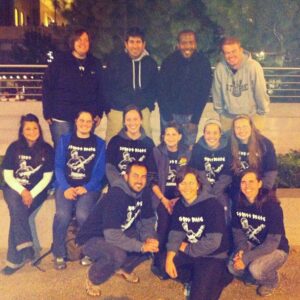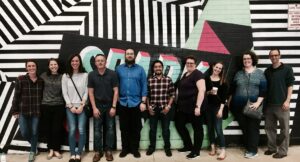This blog post was written by Abby Kowitz, a Master of Science in Clinical Mental Health Counseling student at Divine Mercy University. She is also a regular contributor for Mind & Spirit.
“What they need is Jesus.” I will never forget those words that I first heard during my orientation as a Christ in the City missionary. I had just committed myself to a year of living in community with 14 other Catholic young adults to go out into the streets of downtown Denver and help the homeless. I was scared out of my mind and clung to those words as my support and encouragement while I continually put myself in uncomfortable situations in an attempt to spread the gospel and share Jesus with those I met on the streets. The year and the experience was, in a word, beautiful. It brought about an inner-transformation and growth that has changed the trajectory of my life and I am forever grateful for it. I don’t doubt that the work we did was beneficial for others, but throughout the year I couldn’t shake the gnawing feeling that perpetuated my thoughts – “Am I actually helping those I’m encountering?”
In terms of the mission, I think the answer is a hard yes. As missionaries, we embarked to witness Christ in the poor and be Christ to them in return. Did I do it perfectly? By no means! But I gave it my best shot, and to that degree, I did fulfill the mission I set out to do. What I realize in hindsight however, is that I mistook that statement, “What they need is Jesus,” as sufficient in and of itself, and to be quite honest, and at the risk of sounding like a heretic, it’s not. Though God is the creator and holds everything in his hands, as human beings he created our mind, body and soul. At different times certain components may be more prominent than others, but in order to flourish each part is integrated holistically.

Was the work I did with Christ in the City wrong? No, but it emphasized the spiritual and physical components – did the homeless know the love of Christ and did they have a place to stay that night? Yet the people I was meeting on the streets day after day not only had spiritual and practical brokenness, but mental brokenness as well. That was the tool that was missing from my belt. I continually witnessed addictions, depression, PTSD, and every other mental illness you could name, and I had no idea what to do with it. What’s more, I began to become aware of my own mental health and that of my fellow missionaries. Yes, we were cultivating deep prayer lives, yet I could see intense anxiety, insomnia, the aftermath of childhood trauma, and even depression amongst us. How was I to respond?
It was through this experience with both the homeless and my fellow missionaries that I truly felt the desire and call to pursue a career in mental health. Everyone falls somewhere on the spectrum of mental health. No one is exempt from it and seeking to improve your mental health is not something reserved for the “crazy.” Our lives as Christians are marked by suffering – we imitate Christ on the cross and the question of hard experiences and tragedies is not so much a matter of if as much as when. Each and every one of us will face difficulties whether they’re obvious to others or not, and we need to be able to cope with them and grow into better human beings because of them. The ability to do that is not the result of prayer alone, but a thorough awareness of the psychology of the human person and the need to integrate it into our lives. We may not fully understand it (not everyone can nor is called to pursue a career in counseling), but by realizing that our mental health is an essential component to our flourishing and giving it the time and attention it deserves, our lives can truly give glory to God.

Through my education at Divine Mercy University, I am slowly gaining the tools I realized I lacked and yearned for during my time as a missionary, and my vision of the human person is continually sharpening. These tools are a gift and I cannot wait to share them with others, whether they be my clients, peers, family members and, even, myself.
Interested in pursuing a career in counseling? Request information about the online Master of Science in Clinical Mental Health Counseling program at Divine Mercy University.

